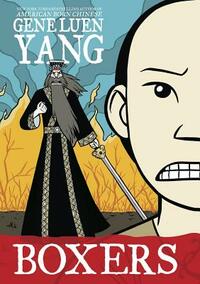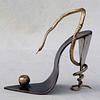Take a photo of a barcode or cover
The other half of the Boxers and [b:Saints|17210471|Saints (Boxers & Saints, #2)|Gene Luen Yang|https://d.gr-assets.com/books/1359199657s/17210471.jpg|23691810] duo. This volume looks at the Boxer Rebellion through the eyes of a young man fighting for China's traditions and history. This duo is a fascinating quick look at the Boxer rebellion and the motivations of young people on both sides.
Actual rating: 3.5
Eh.. I do not seem to be a fan of Gene Luen Yang. I never like his characters, as I can never relate to any of them, and the plot is just okay.
Eh.. I do not seem to be a fan of Gene Luen Yang. I never like his characters, as I can never relate to any of them, and the plot is just okay.
An excellent and complex look at a complicated history that I don't know much about. Gene Luen Yang is able to convey so much through a simple drawing style and direct, well-managed storytelling. Emotions run high, and the moral ambiguity of any conflict is deeply acknowledged and engaged with. I can't wait to read the companion volume to get more of that tension!
I actually read this after I read the second novel in the series, Saints. I had read Saints a few months ago, so I was pleasantly surprised to find that there was a brief meeting between Bao and Vibiana. The crossover, while fleeting, really helped me figure out the opposing sides and their juxtaposition in relation to the other.
Although Boxers is almost twice as thick as Saints, I felt as if Vibiana's story was longer. Maybe it was the sheer tragedy of her story compared to Bao's or the nature of Bao's actions, but I was unable to connect with Bao the way I did with Vibiana. I read that Yang (the author and artist of the series) consciously tried to tell the story of a terrorist without seeming like his behaviour was condoned, and I think Yang has done this really well here. While the reader understands Bao's reasoning for all his actions, it still evoked a sense of discomfort and disbelief at the severity of his actions, further distancing us from the character.
I found it odd how rushed the storyline felt. It felt as if the story was 150 pages long instead of 350. There were a lot of fillers, where Bao and his original band of brotherhood went around the villages and recruited and spread justice, all of which could have been summarised in a couple of pages. Bao didn't undergo much character development either, as he had had an idealistic sense of justice and was obstinate from beginning to end. It felt like Yang was trying to incorporate too many emotions into Bao but ended up focusing on none.
The scene I liked best was the last scene in Peking. As Bao's relationship with Mei Wen blossoms into uncertainty and his judgment becomes more clouded than ever, he begins to unravel, and this brings a lot of consequences for his army. His loyalty goes back and forth between Mei Wen and Ch'in Shi-Huang. But as he has done several times throughout the novel, his ultimate loyalty is to Ch'in Shi-Huang, presumably from a sense of duty to being the 'chosen' representation of him during battle. Unfortunately, by the time he's made up his mind to burn the library to get to the foreign devils, it's too late, and Ch'in Shi-Huang tells him so. If only Bao listened, he probably wouldn't have lost his life, the library, or Mei Wen. It's abrupt and dramatic and ends very suddenly, but I think it encapsulates war well. It's not heroic or poetic or noble, it's just blood and injuries and sudden death.
All that being said, I definitely enjoyed Saints more. Yang did a phenomenal job at weaving in history with fiction and making it enjoyable, though, and I would love to read more of his work.
Although Boxers is almost twice as thick as Saints, I felt as if Vibiana's story was longer. Maybe it was the sheer tragedy of her story compared to Bao's or the nature of Bao's actions, but I was unable to connect with Bao the way I did with Vibiana. I read that Yang (the author and artist of the series) consciously tried to tell the story of a terrorist without seeming like his behaviour was condoned, and I think Yang has done this really well here. While the reader understands Bao's reasoning for all his actions, it still evoked a sense of discomfort and disbelief at the severity of his actions, further distancing us from the character.
I found it odd how rushed the storyline felt. It felt as if the story was 150 pages long instead of 350. There were a lot of fillers, where Bao and his original band of brotherhood went around the villages and recruited and spread justice, all of which could have been summarised in a couple of pages. Bao didn't undergo much character development either, as he had had an idealistic sense of justice and was obstinate from beginning to end. It felt like Yang was trying to incorporate too many emotions into Bao but ended up focusing on none.
The scene I liked best was the last scene in Peking. As Bao's relationship with Mei Wen blossoms into uncertainty and his judgment becomes more clouded than ever, he begins to unravel, and this brings a lot of consequences for his army. His loyalty goes back and forth between Mei Wen and Ch'in Shi-Huang. But as he has done several times throughout the novel, his ultimate loyalty is to Ch'in Shi-Huang, presumably from a sense of duty to being the 'chosen' representation of him during battle. Unfortunately, by the time he's made up his mind to burn the library to get to the foreign devils, it's too late, and Ch'in Shi-Huang tells him so. If only Bao listened, he probably wouldn't have lost his life, the library, or Mei Wen. It's abrupt and dramatic and ends very suddenly, but I think it encapsulates war well. It's not heroic or poetic or noble, it's just blood and injuries and sudden death.
All that being said, I definitely enjoyed Saints more. Yang did a phenomenal job at weaving in history with fiction and making it enjoyable, though, and I would love to read more of his work.
An expressive, thoughtful YA graphic novel about the Boxer Rebellion. Little Bao, the youngest son of a farmer, witnesses the influx of Christians and foreign soldiers disrupting the traditions of his small village. Little Bao's world seems to have no order until he mentors with two spiritual men and takes action into his own hands. Our protagonist comes to believe that he & his compatriots are empowered by the heroes and gods of Chinese operas that caught his imagination as a child. Little Bao ends up leading a band of men across the countryside toward Peking, righting what they see as injustices and eventually persecuting Christians and their followers.
Gene Luen Yang conveys the more brutal aspects of war through Little Bao's main struggle to decide whether to do the right thing or act in service of a defining vision. The nobility of Liu Bei and the Peach Tree Oath from the [b:Romance of the Three Kingdoms, Vol. 1|158771|Romance of the Three Kingdoms, Vol. 1|Luo Guanzhong|https://d.gr-assets.com/books/1364138285s/158771.jpg|16666] works against Ch'in Shih-huang's hard advice about about allegiance to one's land and authority. There are some suggestions of violence and sexuality that parents might object to. But mostly Boxers relies on Little Bao's internal conflict to illustrate the ugliness of war as well as the slow disintegration of the stylized opera look into the harshness of reality. Recommended for those who enjoy historical fiction and don't mind reading a YA title.
Gene Luen Yang conveys the more brutal aspects of war through Little Bao's main struggle to decide whether to do the right thing or act in service of a defining vision. The nobility of Liu Bei and the Peach Tree Oath from the [b:Romance of the Three Kingdoms, Vol. 1|158771|Romance of the Three Kingdoms, Vol. 1|Luo Guanzhong|https://d.gr-assets.com/books/1364138285s/158771.jpg|16666] works against Ch'in Shih-huang's hard advice about about allegiance to one's land and authority. There are some suggestions of violence and sexuality that parents might object to. But mostly Boxers relies on Little Bao's internal conflict to illustrate the ugliness of war as well as the slow disintegration of the stylized opera look into the harshness of reality. Recommended for those who enjoy historical fiction and don't mind reading a YA title.
I really like the art. The colors are flat (no shading) but work so well. They're mostly neutral until water or god-stuff comes in to play, which emphasizes the fantasy world in Little Bao's mind.
The story didn't wow me. It's fine. It's fairly violent in places, but of course it is it's about war. Little Bao starts off as this kid who likes Spring fairs and operas and is slowly turned into a rebel killing machine to save the China he knows. It's not really a happy story, but the art makes it bright and lovely for what it is.
I know nothing about the Boxer Rebellion, so I'm definitely going to read up on it as well as read the other book out of curiosity.
The story didn't wow me. It's fine. It's fairly violent in places, but of course it is it's about war. Little Bao starts off as this kid who likes Spring fairs and operas and is slowly turned into a rebel killing machine to save the China he knows. It's not really a happy story, but the art makes it bright and lovely for what it is.
I know nothing about the Boxer Rebellion, so I'm definitely going to read up on it as well as read the other book out of curiosity.
This is really my introduction to the Boxer Rebellion, so I can't comment on how historically accurate it is (aside from a post-reading Wikipedia binge which aligned with most of what's presented here). It's easy to get caught up in this one boy's story and not think too deeply about the ramifications of what he and his compatriots are doing. I wanted more context, but I also thought the effect of being swept away by the action without knowing how it would turn out let me identify with Bao, to an extent.
The tricky part of reading historical fiction you know is that you have all this information the characters don't have, so this was a different experience than reading fiction based in 19th-century England, for example. I don't know nearly enough Chinese history! Recommendations welcome.
The tricky part of reading historical fiction you know is that you have all this information the characters don't have, so this was a different experience than reading fiction based in 19th-century England, for example. I don't know nearly enough Chinese history! Recommendations welcome.
I really enjoyed the myth mixed with historical fiction that made up Yang's retelling of the boxer rebellion. It was lively and interesting and I got the added benefit of telling myself I was reading something educational.






